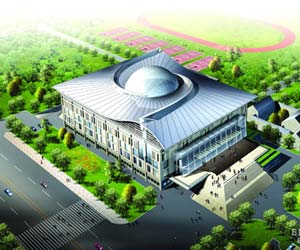| Location |
Peking University |
| Events |
Table Tennis |
| Total land surface |
26,900 sq m |
 |
|
|
Peking University Gymnasium is an indoor venue,
developed for holding table tennis competition in the Beijing
Olympics 2008. The Chinese name for table tennis is ping pong qiao.
The venue is just 8 km away from the central Olympic Village. Peking
University Gymnasium is the world's first sports venue designed and
built for table tennis competitions.
Gymnasium Statistics
Total area of the Peking University Gymnasium is 26,900 sq m. The
venue includes a natatorium and is 122.6 m long from south to north
and 87.7 m wide from east to west. The place on the first floor
where the table tennis competitions would be held is 47 m long and
39.5 m wide, has room for eight competition tables.
Seating Capacity
The gymnasium has the seating capacity of 8,000 people. Of these,
6000 seats are permanent while the rest are temporary.
Architecture
The roof of the gymnasium, resembling a ping pong or table tennis
ball, is one of the most complicated Olympic construction projects.
It seems like a spaceship is about to land. The venue's outer gray
shell blends in well with Beijing's Silicon Valley. As tennis balls
are very light, strict requirements have been met, in particular
with regards to wind speed. The air-conditioning system of the
gymnasium releases air no faster than 0.2 m/sec, fulfilling the
requirement. The gymnasium's double-layer metal surface is
waterproof and heat insulating. It also eliminates noise from
rainfall, and the walls are capable of absorbing sounds. The
spectator seats have air replacement vents installed underneath,
which lessens the dependence on air conditioning.
Zhibeizi courtyard garden, located in vicinity, and
thousand-year-old trees give it that oriental flavor which visitors
to the middle kingdom love.
Post Games
After the games, the gymnasium could be utilized for several
competitions, including table tennis, handball, basketball,
badminton, and volleyball. The gymnasium would play a role in
meeting the needs of physical education, training and recreation of
the university students and the locals. |
